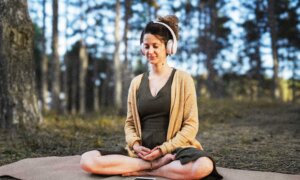6 Habits of Stress-Free Living
1. Do What You Can
One of my biggest stressors is a sense that I’m falling behind or not making progress with things that I need to get done. Even as a practicing minimalist, I still juggle quite a number of goals and responsibilities. One trick that I’ve learned to reduce stress is to make progress on everything I’m working on, no matter how small. This ensures a constant sense of momentum, which keeps stress at bay.
2. Prioritize Rest for Your Body
Working yourself into the ground is a strategy that only works in desperate situations when something needs to get done—or else. But it’s suboptimal in the long run because the recovery period kills your momentum. It’s better to stay healthy and work at a sustainable pace. When I’m pushing my body to the limit, I feel that I’m operating in a mild flight-or-fight mode the whole time.
3. Process With a Wise Friend
I’m a big advocate of community and a critic of the individualism that has taken over our society. Too many people are lonely and trying to navigate the challenges and complexities of life on their own. Nothing helps me manage and reduce my stress more than talking things over with a friend. Saying things aloud to someone you trust helps put things into context and reminds you of what really matters.
4. Exercise at the First Physical Signs of Stress
The quickest stress reliever that I know is exercise. When I feel even the slightest signs of stress creeping in, I go for a walk. When things are really pressing in, I make time for a run. Consistent exercise is an essential tool for living a relatively stress-free life. If you’re trying to manage stress without exercising, you’re missing out on one of the lowest-hanging fruits that you can grab.
5. Find a Truth Bigger Than Your Worries
I can’t emphasize enough how foundational my faith is to all aspects of my life. Prayer is a practice that helps me manage stress, and the worldview that I’ve inherited from my faith helps me maintain a broader perspective on my life without getting too caught up in worries. My advice is to find something bigger than yourself to live for, something that will pull you through seasons of uncertainty or when life isn’t going your way. It has been a huge key for me.
6. Readjust Your Schedule or Expectations
As a parent of four young children, I quickly learned that vacations were no longer the relaxing, pleasure-filled getaways I remembered. Kids are needy, whether they are home or away. It wasn’t until I changed what I expected from a vacation (seeing it as an adventure instead of a relaxing retreat) and adjusted our schedule (to a lighter itinerary with more bathroom and snack breaks) that I began to enjoy them again. With creativity, nearly any area of life can be made more appealing and less stressful if you’re open to new ideas.














